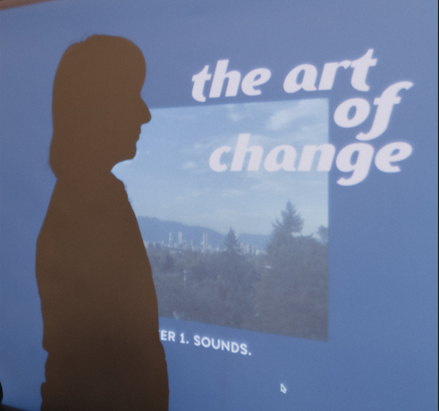The Art of Change: Chapter One – Sounds

Project Details
The Sword Fern Collective is on a mission to make make climate change education more accessible. With the Art of Change series, they use the arts to help people tap in to our emotional responses to climate change and climate action. Their mission is to help everyone establish both a baseline of climate knowledge and a baseline of boundaries, empathy, compassion, justice, and emotional literacy in order to address wicked problems.
Project Description
‘On February 12th 2024, Sword Fern Collective hosted The Art of Change: Chapter 1 – Sounds at Heritage Hall Vancouver. Over 80 participants attended this youth-organized event, with funding from Ocean Wise. The event started with the Worldwide Tuning Meditation by Pauline Oliveros, which invited participants to sing collectively. The concert featured a string quartet composed of Conor Stuart, Jack Campbell, Caroline Olsen, and Yiyang Xue, who performed Plan and Elevation: the Grounds of Dumbarton Oaks by Caroline Shaw, as well as a collective improvisation based on participant-submitted nature footage.
The intention of this project, the first event in The Art of Change series, was to demonstrate how the arts allow people to connect emotionally with climate action and allow us to dive deeper into the feelings behind our responses to climate change.
This project has been created in commemoration of the lives of all the victims of Ethiopian Airlines Flight 302, including two Ocean Bridge ambassadors, Danielle Moore and Micah Messent. We aspire to carry on their legacy and commitment to making the world a better place by creating long-lasting impacts with a firm commitment to driving positive change for the environment and our ocean. We will never forget the light that Danielle and Micah brought to the world and will continue to keep them in our hearts. To learn more about these two amazing people, please visit: Honouring Danielle and Micah – Ocean Wise. This work is partially funded by the Commemoration Fund for Victims of Ethiopian Airlines Flight 302 Tragedy.
What was your biggest challenge?
‘The biggest challenge was the limitation of the grant in not being able to pay ourselves for our labour. It was great that we were able to pay the performers at our event, but it meant that as organizers we were had to do this work in addition to taking on additional paid work to support this project. As such, we were not able to dedicate as much time as we would have been able to if we were paid. We navigated this challenge by limiting the scope of our event and working independently as a team, with weekly short meetings being the most we had time for. Youth deserve to be fairly compensated for their leadership, especially with living costs being incredibly high across the country.
What was your most valuable takeaway?
We didn’t explicitly advertise our event as an environmental/climate event but chose to highlight the music/arts-focused piece. This was incredibly effective, and meant that we got a great diversity of attendees who may not have come out for a “climate event.” We’re going to continue this angle for future advertising.
